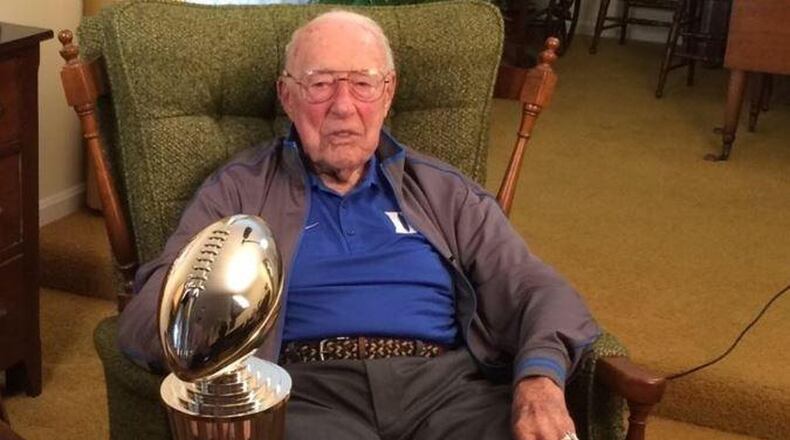Smith played four years of football at Duke University, including in the infamous 1942 Rose Bowl that was moved from Pasadena to Durham.
After completing the regular season with a 9-0 record and No. 2 national ranking, Duke was selected to play Oregon State (7-2) in the Rose Bowl. In the early 1940s, the champion of the Pacific Coast Conference chose its opponent for New Year’s Day.
EARLIER STORY: Hamilton graduate lone 1942 Rose Bowl survivor
Top-ranked Minnesota was the first choice, but the Western Conference, forerunner of the Big Ten Conference, did not permit its teams to play in bowl games until the 1946 agreement between the Big Ten and Pacific Coast Conference.
Smith, who played end on the offense and defense, said in an earlier interview that he and his Duke teammates were eager to play in the Rose Bowl under the sunny Southern California skies.
“We were excited,” Smith said two years ago from his Louisville home. “We looked forward to it.”
Then, just three weeks before the game, the Japanese bombed Pearl Harbor. After World War II started, U.S. officials were concerned about another possible Japanese attack on the West Coast, so the Rose Bowl was canceled.
Eventually, Duke and Oregon State made contingency plans and moved the game to Duke Stadium, the university’s 35,000-seat campus stadium in Durham, N.C. Additional bleachers were borrowed from neighboring North Carolina and North Carolina State to accommodate the crowd. The 56,000 available seats — about half the capacity of the Rose Bowl Stadium — were sold in three days.
Oregon State, a two-touchdown underdog, won the game, 20-16.
In 1943, U.S. officials decided the West Coast was safe enough so the Rose Bowl returned to Pasadena. Meanwhile, in his senior year at Duke, Smith, named captain, injured his knee in the second game and was lost for the season.
He earned a degree in business administration in May of 1943 and immediately entered the U.S. Navy. First training at the University of Notre Dame, Smith was assigned to the USS Richmond serving in the Atlantic. In May 1944, he was assigned to the USS Bright and served as an officer in the South Pacific until the end of World War II.
After his honorable discharge, he returned to Hamilton and worked in the public works department before earning his master’s degree in industrial engineering from Purdue University in 1948.
He was preceded in death by his wife of 56 years, Elsie, who died in 2000. Survivors include children Pam Gatz (Barry); Jim Smith; and Patti Meyer (Daniel); grandchildren Jennifer Smith-Barton (Matthew), Lauren Smith, Emley Smith, Sydni Meyer and Craig Meyer (Gabrielle) and three great-grandchildren: Jack, Desiree, and Joseph.
About the Author

